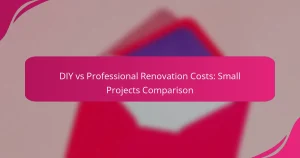Home renovation solutions in Los Angeles are designed to improve both the functionality and aesthetics of your living space while enhancing energy efficiency. With options ranging from kitchen and bathroom upgrades to outdoor living enhancements, these renovations cater to the specific needs of the local climate and lifestyle. Selecting the right contractor is crucial, as it involves evaluating their qualifications and past work to ensure your project is in capable hands.
Solar Panels: Benefits, Cost Analysis and Installation Considerations
Solar panels present a compelling solution for those seeking to lower energy costs while contributing to environmental sustainability. With installation costs ranging from $15,000 to $30,000, potential savings and benefits…
Home Renovation Budget: First-Time Homeowners, Planning and Cost Management
For first-time homeowners, creating a home renovation budget is essential for managing expenses and achieving desired improvements. By assessing financial capacity, prioritizing projects, and estimating costs, homeowners can navigate the…
DIY vs Professional Renovation Costs: Small Projects Comparison
When considering home renovations, homeowners often face the choice between DIY projects and hiring professionals. While DIY can offer significant savings on labor costs, the overall expenses can fluctuate based…
Home Renovation Financing: Options, Benefits and Key Considerations
Home renovation financing provides homeowners with various options to fund their projects, including home equity loans, personal loans, and FHA 203(k) loans. Each financing method comes with distinct benefits and…
Local Regulations: Compliance, Permits and Inspections
Understanding local regulations is crucial for businesses, as they dictate compliance with safety, health, and environmental standards. Securing the appropriate permits and undergoing necessary inspections are essential steps to ensure…
Outdoor Renovation Trends: Curb Appeal, Landscaping and Outdoor Living
Outdoor renovation trends are increasingly focused on enhancing curb appeal through innovative designs and sustainable practices that elevate both beauty and functionality. Homeowners are investing in landscaping that creates harmonious…
Flooring Options: Durability, Maintenance, and Style
When selecting flooring, it’s essential to consider durability, maintenance, and style to find the perfect fit for your space. Options like hardwood, tile, vinyl, laminate, and concrete each provide distinct…
Sustainable Materials: Value Addition, Durability and Environmental Benefits
Sustainable materials play a crucial role in modern construction by providing significant environmental benefits, enhancing durability, and adding value to projects. By utilizing resources such as bamboo, recycled steel, and…
Kitchen Renovations: Budgeting Under €10,000 and Cost Control
Renovating your kitchen on a budget of €10,000 is achievable with careful planning and prioritization of your needs. By defining your goals and tracking expenses, you can effectively manage costs…
Waste Reduction: Strategies, Recycling Methods and Disposal Options
Waste reduction is a critical component of sustainable living, focusing on minimizing waste generation and enhancing recycling efforts. By adopting strategies such as composting, zero waste policies, and community education,…
What are the best home renovation solutions in Los Angeles?
The best home renovation solutions in Los Angeles focus on enhancing functionality, aesthetics, and energy efficiency. Popular options include kitchen remodeling, bathroom upgrades, basement finishing, outdoor living spaces, and energy-efficient renovations, all tailored to the unique demands of the local climate and lifestyle.
Kitchen remodeling
Kitchen remodeling in Los Angeles often involves updating appliances, cabinetry, and countertops to create a modern and functional space. Consider open floor plans that integrate dining and living areas, which are popular in many LA homes.
Budgeting for a kitchen remodel typically ranges from $15,000 to $50,000, depending on the extent of the changes. Focus on durable materials that withstand the local climate, such as quartz countertops and energy-efficient appliances.
Bathroom upgrades
Bathroom upgrades can significantly enhance comfort and property value in Los Angeles. Common improvements include installing new fixtures, updating tiles, and adding storage solutions.
Costs for bathroom renovations generally fall between $10,000 and $30,000. Prioritize water-saving fixtures to align with California's water conservation regulations, which can also lower utility bills.
Basement finishing
Finishing a basement can create additional living space, ideal for home offices, guest rooms, or entertainment areas. In Los Angeles, ensure that your basement complies with local building codes and permits.
The cost for basement finishing typically ranges from $20,000 to $60,000. Consider soundproofing and proper ventilation to enhance comfort and usability in this often-overlooked area.
Outdoor living spaces
Outdoor living spaces are essential in Los Angeles, where the climate encourages year-round use. Popular features include patios, decks, and outdoor kitchens that extend the living area and enhance entertaining options.
Investing in outdoor renovations can range from $5,000 to $50,000, depending on the complexity. Use weather-resistant materials and consider landscaping to create a cohesive look that blends with the natural surroundings.
Energy-efficient renovations
Energy-efficient renovations are increasingly important in Los Angeles due to rising energy costs and environmental concerns. Key upgrades include installing solar panels, energy-efficient windows, and improved insulation.
Budgeting for energy-efficient improvements can vary widely, from a few thousand dollars for basic upgrades to tens of thousands for comprehensive systems. Look for local rebates and incentives to offset costs, making these upgrades more accessible and beneficial in the long run.
How to choose a home renovation contractor?
Choosing a home renovation contractor involves assessing their qualifications, understanding their pricing, and reviewing their previous work. This process ensures that you find a reliable professional who can meet your renovation needs effectively.
Check credentials and reviews
Start by verifying the contractor's credentials, including licenses and insurance. In many regions, contractors must hold specific licenses to operate legally, which protects you from potential liabilities.
Additionally, read online reviews and testimonials from past clients. Look for patterns in feedback regarding their reliability, quality of work, and communication skills to gauge their reputation.
Request detailed estimates
When requesting estimates, ask for a breakdown of costs, including materials, labor, and any additional fees. This transparency helps you understand where your money will go and allows for better comparisons between contractors.
Be cautious of estimates that are significantly lower than others, as they may indicate hidden costs or subpar materials. Aim for estimates that fall within a reasonable range based on your project's scope.
Evaluate past projects
Review the contractor's portfolio of completed projects to assess their style and quality of work. Look for projects similar to yours in size and scope to ensure they have relevant experience.
Consider visiting some of their completed sites or asking for references to speak directly with previous clients. This firsthand insight can provide valuable information about the contractor's reliability and craftsmanship.
What are the costs of home renovations in major US cities?
The costs of home renovations vary significantly across major US cities, influenced by local labor rates, material costs, and the scope of the project. Generally, homeowners can expect to spend anywhere from tens of thousands to over a hundred thousand dollars depending on the type of renovation and location.
Average kitchen remodel costs
Kitchen remodel costs typically range from $15,000 to $50,000, with high-end renovations exceeding $100,000. Factors influencing the price include the size of the kitchen, the quality of materials, and whether structural changes are needed.
In cities like San Francisco and New York, labor costs can drive prices higher, while more affordable markets like Houston may offer lower overall expenses. Homeowners should consider prioritizing essential upgrades, such as appliances and cabinetry, to maximize value.
Bathroom renovation pricing
Bathroom renovations generally cost between $10,000 and $30,000, depending on the extent of the updates. A simple facelift, including new fixtures and paint, can be done for less, while a complete remodel with new plumbing and layout changes will be more expensive.
In cities with a high cost of living, like Los Angeles, homeowners may find themselves on the higher end of this range. It’s advisable to set a budget and stick to it, focusing on features that enhance functionality and aesthetics.
Basement finishing expenses
Finishing a basement can cost between $20,000 and $50,000, depending on the size and desired features. This process often involves insulation, flooring, and adding bathrooms or wet bars, which can significantly increase costs.
In areas where basements are common, such as the Midwest, homeowners may find more competitive pricing. It’s essential to check local building codes and permits, as these can affect overall expenses and project timelines.
What are the latest trends in home renovation?
The latest trends in home renovation focus on sustainability, technology integration, and open living spaces. Homeowners are increasingly prioritizing eco-friendly materials, smart home features, and layouts that promote social interaction.
Sustainable materials
Sustainable materials are becoming a cornerstone of modern home renovations. Options like bamboo flooring, recycled glass countertops, and reclaimed wood not only reduce environmental impact but also add unique character to spaces.
When selecting sustainable materials, consider certifications such as FSC (Forest Stewardship Council) for wood products or LEED (Leadership in Energy and Environmental Design) standards for overall building practices. These certifications ensure that materials are sourced responsibly.
Smart home technology
Smart home technology enhances convenience and energy efficiency in renovated spaces. Features such as smart thermostats, automated lighting, and security systems can be integrated seamlessly into the home, allowing for remote control and monitoring.
Investing in smart technology can lead to long-term savings on utility bills. For example, smart thermostats can reduce heating and cooling costs by up to 15% by optimizing energy use based on your habits.
Open floor plans
Open floor plans continue to gain popularity as they create a sense of spaciousness and encourage social interaction. By removing walls between the kitchen, dining, and living areas, homeowners can foster a more connected living environment.
When considering an open floor plan, think about how to maintain functionality. Use furniture placement and area rugs to define spaces within the open layout, ensuring that each area serves its purpose without feeling cluttered.
What permits are required for home renovations?
Home renovations typically require various permits to ensure compliance with local building codes and safety regulations. The specific permits needed can vary based on the scope of the project and local laws.
Building permits
Building permits are essential for most structural changes, such as additions, major renovations, or new constructions. These permits ensure that the work meets safety standards and zoning laws.
To obtain a building permit, you usually need to submit detailed plans and specifications of the proposed work to your local building department. The cost can range from a few hundred to several thousand dollars, depending on the project's size and complexity.
Common pitfalls include starting work without a permit, which can lead to fines and the need to undo completed work. Always check with your local authorities to understand the specific requirements in your area.
Electrical permits
Electrical permits are required for any significant electrical work, including rewiring, adding new circuits, or installing new fixtures. These permits ensure that the electrical systems are safe and comply with the National Electrical Code.
Obtaining an electrical permit typically involves submitting plans and may require inspections at various stages of the work. Fees for electrical permits can vary widely, often ranging from $50 to several hundred dollars based on the extent of the work.
It's crucial to hire a licensed electrician for projects requiring electrical permits to avoid safety hazards and ensure compliance. Failing to secure the necessary permits can result in costly fines and complications when selling the property in the future.






